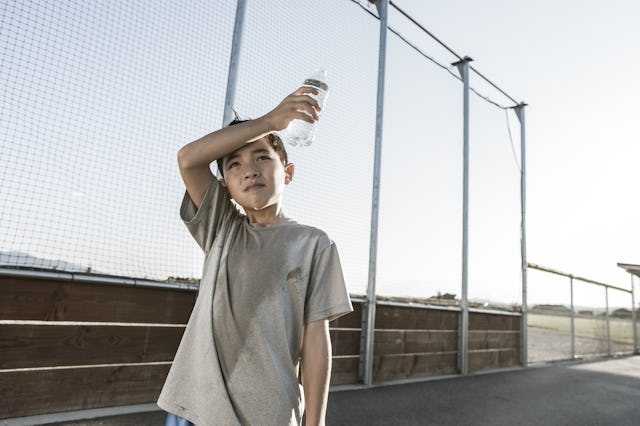I Have A Really Sweaty Kid — Normal, Or Should I Be Worried?
It's probably nothing to panic over, but too much sweating can be a sign of an actual medical condition.

Children generally have tons of energy, which explains their tendency to bounce off the walls at all hours of the day. And all this movement can cause their body temperatures to rise, which usually results in… a lot of sweating! While sweating is normal, and one of the ways the body regulates its temperature, excessive sweating can be uncomfortable and embarrassing for kids — and potentially a sign of underlying medical issues.
Wondering how much sweating is too much and when to be concerned? We checked in with a pediatrician to find the answers.
What causes sweating?
The palms and feet are the two areas of the body with the highest concentration of eccrine sweat glands and primarily respond to things that affect the sympathetic nervous system, like emotional and mental stress. If you've ever had to speak in front of a large crowd, those sweaty palms might suddenly make sense. Though eccrine glands cover nearly the rest of the body, they mostly serve a thermoregulatory function, which is just a fancy way of saying they cool us down when overheated.
What causes excessive sweating?
When the body produces an excessive amount of sweat, meaning beyond what's necessary to sufficiently regulate its temperature, it's what's medically referred to as hyperhidrosis. According to Jessica Madden, MD, "The most common areas of the body affected in hyperhidrosis are the palms of the hands, soles of the feet, face, and under the arms." But telling the difference between average and excessive sweating can be difficult, especially if it's a hot day or your child has a fever. So, how can parents tell the difference?
"A giveaway sign of hyperhidrosis is when a child usually sweats a lot more than other children who are in the same location, despite being in the same temperature and climate," says Madden. It's not uncommon for those experiencing hyperhidrosis to also sweat excessively under seemingly normal temperatures and circumstances.
Hyperhidrosis, like many medical conditions, can run in the family and affects nearly 3% of the population. Because hyperthyroidism, hypertension, hypoglycemia, and nervous system disorders can all be underlying causes of hyperhidrosis, checking in with your child's doctor if you suspect they are sweating more than usual is recommended.
How do you treat hyperhidrosis in kids?
Depending on the cause, hyperhidrosis can be treated in various ways. Many people with the condition experience anxiety and find psychotherapy, or therapy, sessions helpful. Antiperspirants are another common everyday treatment for hyperhidrosis. The aluminum salts contained within them work by blocking sweat glands. Typically marketed as a solution for underarm sweating, antiperspirants are usually safe when used on the feet, back, and other parts of the body where excessive sweating is a problem.
Additional treatments for hyperhidrosis include:
- Anticholinergics: Medications that block chemical receptors involved in sweat production. These can include drugs such as Glycopyrrolate — a drug that comes in topical and oral forms and is also used to treat peptic ulcers and neurological disorders — and Oxybutynin.
- Iontophoresis: A treatment that passes gentle electrical currents through the skin, temporarily halting the parts of the nervous system involved in sweating and changing the skin's pH balance.
- Botulism toxin (Botox): Prevents the release of a neurotransmitter necessary for normal sweat gland functioning.
- Surgery: In extreme cases, the sweat glands can be surgically removed.
- Prescription antiperspirants: Your doctor may also recommend prescription antiperspirant, which usually has aluminum chloride. Popular brands include Drysol or Xerac Ac. It's usually applied before bed and is supposed to be rinsed off in the morning.
- Nerve blocking medicine: This treatment helps block the chemical signals nerves use to communicate with each other. This helps reduce sweating.
Can hyperhidrosis be stopped permanently?
There isn't a cure for hyperhidrosis or a way to stop excessive sweating permanently. Some people consider a minimal invasive surgery called thoracoscopic sympathectomy. It’s also known as endoscopic transthoracic sympathectomy, and during this procedure, a part of the sympathetic nerve chain that lines the back is cut and sealed. This blocks the nerve signal that causes your body to sweat excessively.
According to Madden, excessive sweating isn't just a nuisance but an actual medical condition that can have detrimental effects on a child's health if left untreated. For more information on hyperhidrosis, contact your child's doctor.
Expert Source:
Jessica Madden, MD
This article was originally published on